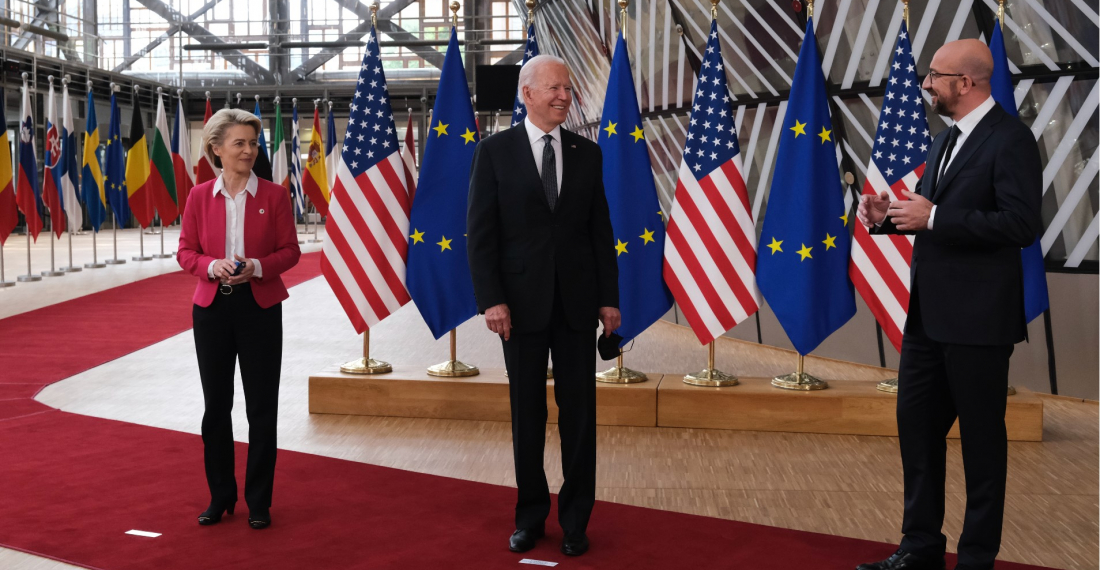US president Joe Biden on Tuesday (15 June) visited the European institutions in Brussels for meetings with European Council president, Charles Michel, and European Commission president, Ursula von der Leyen.
The US and EU issued a joint statement outlining agreements in a number of spheres, including three major new trade initiatives: a Cooperative Framework for Large Civil Aircraft; to engage in discussions to resolve differences on measures regarding steel and aluminium by the end of the year; and to establish an EU-US Trade and Technology Council.
On co-operation in the sphere of international relations the leaders adopted the following statement:
Together, the EU and the US are an anchor for democracy, peace and security around the world. They are united in their desire to peacefully prevent and resolve conflicts, uphold the rule of law and international law, and promote human rights for all, gender equity and equality, and the empowerment of women and girls. The two partners intend to support democracy across the globe, including by defending media freedom, advancing a free and open internet, fostering responsible behaviour in cyberspace and tackling disinformation.
"The leaders resolved to lead by example at home, and to partner in the Summit for Democracy, committing to concrete actions to defend universal human rights, prevent democratic backsliding and fight corruption.
The EU and the US intend to closely consult and cooperate on the full range of issues regarding China, which include elements of cooperation, competition, and systemic rivalry. They intend to continue coordinating on their shared concerns, including ongoing human rights violations in Xinjiang and Tibet, the erosion of autonomy and democratic processes in Hong Kong, economic coercion, disinformation campaigns and regional security issues.
We remain seriously concerned about the situation in the East and South China Seas and strongly oppose any unilateral attempts to change the status quo and increase tensions. We underscore the importance of peace and stability across the Taiwan Strait and encourage the peaceful resolution of cross-Strait issues.
The EU and the US also intend also to coordinate on their constructive engagement with China on issues such as climate change and non-proliferation, and on certain regional matters.
The EU and the US stand united in their principled approach towards Russia. They are ready to respond decisively to its repeating pattern of negative behaviour and harmful activities. The leaders agreed to establish an EU-US high-level dialogue on Russia to coordinate our policies and actions in this regard.
The leaders also addressed a wide range of other pressing geopolitical, foreign policy and security issues of common concern.
They expressed their determination to continue to stand in support of the sovereignty, independence and territorial integrity of the EU’s Eastern partners, and to support the reform path of Ukraine, Georgia and the Republic of Moldova. They resolved to work towards long-term peace, resilience and stability in the South Caucasus.
The EU and the US stand with the people of Belarus and their demands for human rights and democracy.
We resolve to hold the Lukashenka regime to account for its escalating attacks on human rights and fundamental freedoms, and for endangering aviation safety through the unprecedented and unacceptable forced diversion of an EU passenger airplane under false pretences, and the subsequent arrest of a journalist as part of a continuing assault on opposition voices and the freedom of the press.
Moreover, the EU and the US intend to further strengthen their joint engagement in the Western Balkans, and resolved to work hand-in-hand for sustainable de-escalation in the Eastern Mediterranean, where differences should be settled through dialogue in good faith and in accordance with the international law of the sea. The EU and the US also aim to establish a cooperative and mutually beneficial relationship with a democratic Turkey.
The leaders welcomed the ceasefire in the conflict in the Middle East and expressed their grave concern about the political, human rights, security and humanitarian situation in Ethiopia, Somalia and the Sahel countries, in particular about the growing political and ethnic polarisation throughout Ethiopia that threatens the country’s sovereignty and territorial integrity. The leaders also discussed specific financial and development support for African countries.
They also discussed the situations in the Indo-Pacific, Myanmar, Afghanistan, Latin America and the Caribbean, and in particular Venezuela, and resolved to work together to maintain the Arctic as a region of peace and stability.
The leaders emphasised their support for the ongoing diplomatic efforts and negotiations in Vienna aimed at facilitating the return of the US to the Joint Comprehensive Plan of Action (JCPOA), as well as the full and effective implementation of the deal by Iran and the US.
Finally, the leaders welcomed the EU’s invitation to the US to join the PESCO Military Mobility project as an important step towards a closer EU-US partnership in security and defence. The leaders committed to working towards an Administrative Arrangement for the US with the European Defence Agency, and agreed to work together to raise the level of NATO-EU ambition to further strengthen this mutually reinforcing key strategic partnership.






